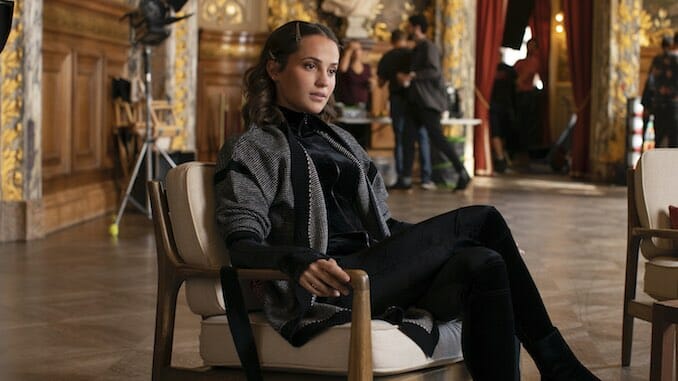Oliver Assayas’ Irma Vep on HBO Is a Strikingly Unique Meta-Sequel
Photo Courtesy of HBO
“It’s a TV show, not some indie feature.” This exemplifies what writer and director Oliver Assayas has predicated with his limited series, Irma Vep. The new HBO and A24 collaboration reimagines Assayas’ own 1996 movie, this time with Academy Award-winner Alicia Vikander in the lead role. The new eight-episode series expands upon earlier themes of an outsider actress, celebrating early 20th century serials, and the miracle of film production. It’s still the story of a film crew trying to adapt the 1915 serial film The Vampires for a modern era, but there are plenty of new wrinkles to the proceedings that help this series surpass the original. It’s ostensibly about how film production all works, but it’s also quite funny, with its eclectic personalities fumbling through creating what they all hope will be a great work of art.
It all begins as Mira (Vikander) is taking a new direction with her acting career. Following the success of her latest blockbuster Doomsday, she’s decided to retreat to France and sign on to a new indie project with a director she’s thrilled to work with. She wants a smaller project that will let her showcase her range rather than thankless blockbuster roles. Additionally, it doesn’t hurt that she’ll be on another continent from her ex-girlfriend and former assistant Laurie (Adria Arjona). The character of Irma Vep is enticing to her—a strong, beautiful criminal who is one of silent cinema’s most iconic figures, complete with a form-fitting black catsuit that helped define the power and sex appeal of the character for over a century.
The director of the new “Irma Vep” series within the show is Rene Vidal (Vincent Macaigne). This is the same Rene Vidal portrayed by Jean-Pierre Leaud in Assayas’ movie. His previous attempt at adapting The Vampires didn’t satisfy his curiosity, though, and now with the proper funding he envisions recreating the entire serial by repeating the same exact sequences, but with modern tools. This Rene Vidal is incredibly anxious about his ability to complete this project, although he is highly medicated and currently seeing a therapist for his self-esteem problems. Macaigne is the perfect choice to play Vidal this time around; he portrays a character who has enough ambition to get a project to the finish line, but with a whole host of other issues bubbling right under the surface.
When Assayas made Irma Vep in the ‘90s, it featured revered Hong Kong actress Maggie Cheung playing herself in the lead role (she was, at the time, also married to Assayas). The idea was that this international film star would travel to France to undertake this role because she was interested in not only the material and leaving the trappings of Hollywood behind, but also in working with Vidal. Assayas wrote his script so that Cheung would be in a foreign country undertaking this independent film, but also oblivious to a lot of the chatter around her due to the language barrier (Cheung didn’t speak French, only sparse English in the film). In a lot of scenes, Cheung would be agreeable while her custom designer Zoe (Nathalie Richard) would talk to her friends about her crush on Cheung. While Vikander’s Mira is an American in France, there are similar challenges in adjusting to a new home. Zoe has also been brought back for the series as a reinvention, this time portrayed by Jeanne Balibar, but still filled with flirtatious desires for the lead of “Irma Vep.”
With Irma Vep transitioning from a film into a series, one of the biggest changes comes from the scope. Not only is the series able to expand upon a lot of the turmoil and ridiculous demands that can happen on set, but specific scenes from The Vampires are shown in their entirety before transitioning into the new material created by Vidal and company. That scope expansion also means that the cast has been expanded significantly as well. Mira’s new assistant Regina (played by fashion model Devon Ross in her screen debut) is fully attuned to Mira’s needs and desires, making sure the star is always pleased. She’s Mira’s shadow, and with that knowledge, she’s able to have a lot of influence over Mira’s decisions. Then there’s Mira’s manager (Carrie Brownstein) who frowns upon Mira’s new venture in France because more lucrative opportunities are more beneficial to her needs. Finally, one of the best additions to the cast is Gottfried (Lars Eidinger), a ridiculous German actor with a crack addiction, who plays the Vampires’ rival, Moreno. It’s a full-bodied physical performance from Eidinger, whose addictions make him a true wild card to the production—Gottfried is obviously a gifted performer, but he might not be worth the headache.